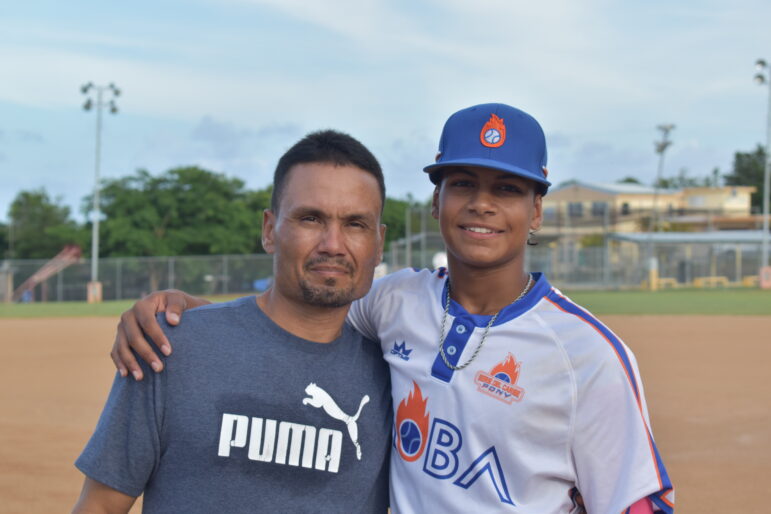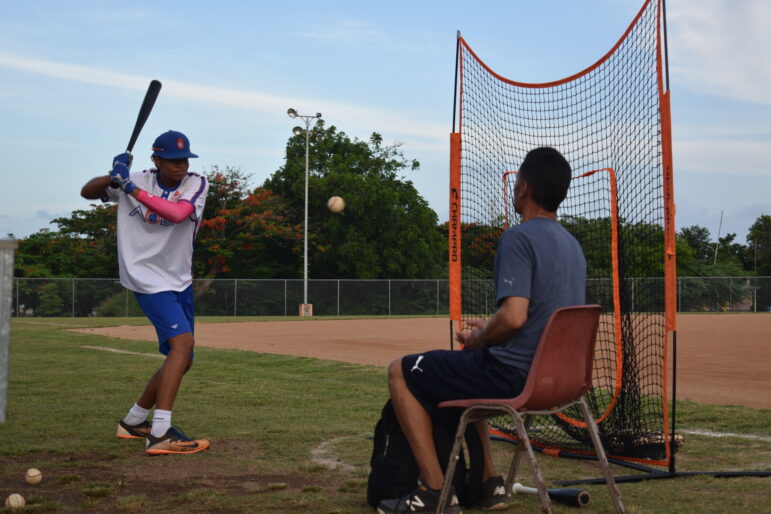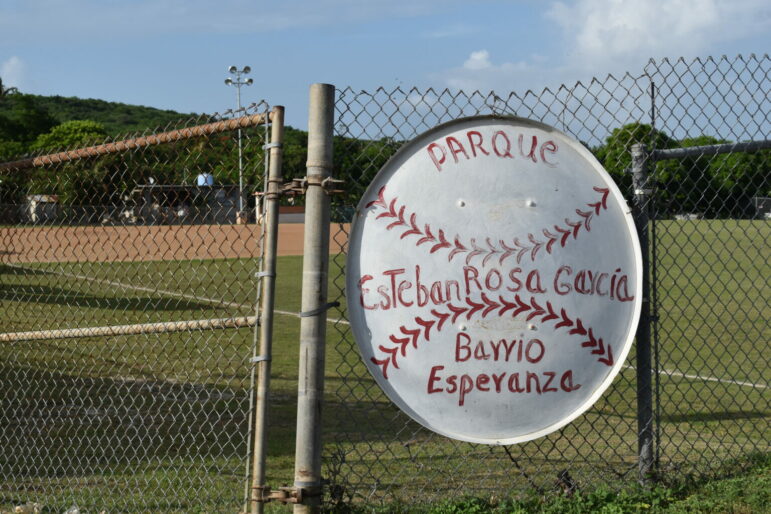Home runs are not pulled off in the batter’s box. But when you slam hit with the bat of resistance, far-reaching home runs are connected in the park of life.
Good baseball is played on the island municipality of Vieques, known as la “Isla Nena.” And for many years they have also known here what it is like to hit home runs without having a baseball bat in their hands.
While many come to Vieques to enjoy its pristine beaches, Eddie Martínez Medina, 15, is with his father, Eddie Martínez Ponce, at a baseball practice in the Esperanza neighborhood. It is an atypical practice because it’s only his father and him. The heat that is felt in the Esteban Rosa Park is classic of a sunny afternoon in the tropics. Eddie wants to “be ready” and that’s why he gets into it even though the sun is blazing.
Bimbino, as he is known in the neighborhood, studies at the specialized school Albergue Olímpico Baseball Academy, in Salinas, in the southern coast of Puerto Rico, where he spends the nights between Monday and Thursday.

Photo by José Manuel Encarnación Martínez | Center for Investigative Journalism
Between Sundays and Thursdays, this young man records no less than 300 kilometers on his trips, which combine sea and land; a sacrifice bunt down the line of determination. He combines education and sports “to strive ahead ,” although that consumes more energy than what he burns up when he sweats his uniform on the field of play.
There are about 600 teens between the ages of 15 and 19 in Vieques, but today Eddie is the only one in this park, which is the only one that has lighting in the entire small island territory that the US Navy occupied for decades to carry out military exercises. He is leaning against a fence where he hangs a banner with a quote from Chinese philosopher Lao Tzu: “A journey of a thousand miles begins with a single step.”
The young man reads those words almost each time he goes to the park, “because they motivate,” but in his travel history there are more bad days than good. “That’s always like that,” he says, referring to the balance of the hardships and the hectic routine with maritime transport. He insists that “life is complicated” and explains it as if it were a baseball game. “Perhaps you field poorly, but at bat you look good,” he details, to highlight the similarity of the balance that being alive implies.
According to Census data, it is estimated that 19% of the Vieques population is minors under 18 years of age. According to the municipality’s Sports and Recreation Office, 282 young people participate in the 10 active sports programs on Isla Nena. Only 20 play baseball, in a single team of 14-year-olds who must travel by ferry to play in the Isla Grande as Puerto Rico is referred to.
There are home runs in Eddie’s head that cannot be seen with the naked eye.
“As a Viequense and a baseball player, you must make many sacrifices. Getting up in the morning, taking the ‘ferry’… You can be woozy when you get to the park to play and maybe only to take two turns” at bat, he says.
Bimbino’s father, who also played the sport and was a Little League manager, walks toward us. He has been looking at the playing field of the park that the community itself repaired after Hurricane María in 2017, because so far, the government has not begun repair work in Vieques. Last year the municipal Sports and Recreation Office was operating with a budget of $140 in cash. The highest budget in recent months does not exceed $5,000, according to its director Héctor Pérez Horta.
The former manager walks over to pick up a couple of balls to throw to his son when it’s his turn to hit into the net, a drill they repeat continuously to perfect their hitting mechanics. Before starting, he sits in the bleachers to relate that he works as a landscaper and his wife is a school janitor.
“We work and sacrifice ourselves for him and we see the results, what he does. The responsibility, the discipline that he has. It motivates us to move on with him. You know? To give everything for him. As long as he has interest and discipline, he can count on me until the end,” he said.
Eddie’s parents bite the bullet for him to study at a specialized sports school, which is private, even if they must move heaven, sea, and earth in their jobs. In August they pay $2,500 in tuition to the institution and a monthly payment of $300.
About seven Viequense students from multiple disciplines are active in the Albergue Olímpico.
“We work, work, work, and we save. I can be working under the sun, doing three yards under the sun, but when I get to the park and see my children, I’m renewed,” says the father of the teen and a young university student.
He smiles. He looks at his boy and his eyes sparkle. Eddie does his warm-up routine on the field. He doesn’t get instructions. He simply executes. He flows like someone who has been doing this for a long time.
The father says the family’s goal is for the youngest of their children to get accepted into a good university. The eldest daughter, Katherine Martínez Medina, was the first in the family to get a sports scholarship in baseball and is currently a student at the University of Puerto Rico. The father is excited to know that his youngest son is also talented and acknowledges that he would like him to continue playing baseball until he gets a Major League opportunity, although he says this is not the priority. What matters is that Eddie understands that through the game he is passionate about he can be a good person. For this family, the park is a learning experience.
“Every time my son stands in that on-deck circle [before taking an at-bat] the first thing he does is look toward the stands, looking for his mom and dad. And that is very important in his development,” he states.
In his experience, it is becoming increasingly harder in Vieques to keep families involved in the young people’s academics, sports and job development. The economic crisis is rapidly worsening, he says, highlighting the increase in the cost of living. Here, 65% of families live with an annual income of less than $25,000 and 19% live with an annual income of less than $10,000.

Photo by José Manuel Encarnación Martínez | Center for Investigative Journalism
Bimbino’s father resents that the underworld is a tempting alternative for so many teens and young people because of the lack of services and opportunities. He has seen that trend through the years. He talks about a “hit,” of a “prospect” that he met in his years as a manager. “I was very proud, happy, because I said ‘damn, finally, the dad is coming’ (to see him play).”
That father did not usually accompany his son when the little league team made its trips to the Isla Grande to play. “When we got to the park, the boy hit a home run, that was in Fajardo, and when that boy was running and looking toward the stands [looking for his father], my heart broke. That dad wasn’t there. He was not there.” He rather used the trip to run other errands and not to see his son. “That breaks my heart. Seeing parents, who have talented young children, walk away, and let their children go off track. That makes me angry. It’s not easy. And now [the young baseball player] is a drug mule. He’s a drug mule,” said the former manager.
He recognizes that although the park is an opportunity to move the boys ahead, he acknowledges that recently, there have been very few who make the commitment to the sport, precisely because of the challenge that betting on this decision implies in this island municipality.
Drug trafficking in Vieques has provoked several state and federal police interventions this year. The most recent was the seizure of a shipment of 1,200 kilos of cocaine, valued at around $20 million. The detainees, who transported the drug in a boat, were 27 and 22 years old.
In 2021, 15 people were arrested on Vieques for drug trafficking in another police sting. Recently, the director of the Playa Grande Elementary School, Naomi Félix, sent a message through the school’s social media channels asking the neighboring communities to respect the educational areas in the face of the uptick in crime.
Eddie Ponce Rosa, Bimbino’s father’s uncle, is also in the park. He was a Little League manager on Vieques for 30 years. Recently, he retired from teaching.
“Fifty kids used to come to this park to practice when I was manager. On a day like today, a Thursday [in summer], this park was packed. Look at it now,” he laments. There are more horses grazing than children playing in this community.
“And when you manage to organize a team with 13 or 14 kids, there are few who finish the season, because of the sacrifice. You have to travel to [the la Isla Grande of] Puerto Rico. There are no little leagues here anymore, there’s nothing. Making a team means traveling with those kids every weekend to the Isla Grande [by ferry],” he explains.
As in the Isla Grande, in Vieques, less than 50% of the population has a car, according to Census data. Eddie’s family pays about $55 a month to leave their car in a parking lot in Ceiba to move around easier when he’s on the big island. When things get complicated, and they can’t take Eddie to Salinas, he has to coordinate the ride with a friend who offers his car to make the trip once the boy arrives in Ceiba. The same with the return trip from Salinas in the South to Ceiba in the East.
Eddie has already lost count of the times he has had to find a place to stay when the ferry has left without him on his trips back home. Sometimes he has to sleep at someone else’s house.
“It’s complicated and you don’t know on which ferry you´ll travel back,” says the young man. Buying tickets is a headache most of the time, because of the disorganization and the cost. After the ferry service was privatized, tickets can be exchanged for another trip only 24 hours after the original trip’s departure. If Eddie has a setback or delay getting to Ceiba, this means getting stranded or spending money on a new ticket.
HMS Ferries, the private company that assumed control of the ferry service operations on December 15, 2021, told the Center for Investigative Journalism (CPI, in Spanish) that since then it has maintained a 98% on-time departure rate on trips to Vieques and that “On the rare occasions that a vessel experiences a mechanical problem that prevents making a trip, the company puts another ferry into service.”
Although the company did not offer data to support this record of trip cancellations or changes, several Viequenses confirmed to the CPI that, in effect, the ferries, most of the time over the last year, have sailed on time. At the same time, Viequenses have publicly denounced that when a ferry’s departure time approaches, after boarding closes, tourists are given priority over residents, leaving them stranded.
However, the experience of this young player does not always conform to travel schedules. “You don’t know if you’re going back that same day or if you’ll have to stay in a guest house or a friend’s house. There are many sacrifices… money, time…,” the young man says. The last boat that sails from Ceiba to Vieques between Monday and Friday leaves at 7 p.m. On weekends, the ferry with the latest departure time for Isla Nena leaves at 7:30 p.m. from Ceiba which conditions the lives of young people like Eddie, who live in an eternal race against time.
That word — sacrifice — resonates as loudly as every shot Eddie hits against the net practicing under the sun.
The uncle has been watching the nephew in silence for some time. He has a son who is a baseball player in Canada, whom he coached from this same park and with the same challenges that his nephews take on today. “You don’t live here, you survive here,” he says. “In sports and in social life as well. And those challenges are what make us stronger and make us compete.”
From his perspective, athletes from Vieques are always at a disadvantage compared to those from the Isla Grande.
“Those from the big island get up, get in their car, and arrive at the park. Here, you must get up at 4 a.m. to catch a ferry every weekend [when there are games],” he explains. The first ferry passenger trip from Vieques to Ceiba leaves at 6 a.m.
He adds that the challenges of playing sports are worsened because there are teams on the big island that condition the permanence of athletes from Vieques in their organizations to the requirement of mid-week practices, even when they know how complicated maritime transport is and the economic challenges involved.
“They have no guarantee of where to stay, no guarantee that they will be able to take the ferry back to sleep at home. If the games finish at 3 p.m., the one who lives on the big island leaves the park and goes home. The one from Vieques gets back [home] at 11 or 12 at night,” says Eddie Ponce Rosa.
It’s Saturday, and the young man got up at four in the morning to arrive at a park in Caguas, in Puerto Rico central region, a few minutes after the umpire shouted, “play ball.” This trip is in addition to the two weekly trips to and from school in Salinas. He has games in Caguas, Arecibo, Barceloneta, Loíza, Carolina, Aibonito or wherever he plays ball on the weekends.
“We eat breakfast along the way quickly, rushed, but we always get to the game. Always a little late, but we get there,” he says.
Once the two games are over, Eddie returns to Ceiba at night. The plan is to always go back to Vieques the same day. The ferry’s last trip leaves at 7:30 p.m. But sometimes the ferry leaves them behind or there are problems with the tickets. The trip from Caguas to the ferry terminal in Ceiba takes at least one hour. On Sunday, Eddie starts moving again at 3:30 p.m., as usual, to go to school in Salinas. He stays there until Thursday when he repeats the marathon on his way back.

Photo by José Manuel Encarnación Martínez | Center for Investigative Journalism
The clock strikes two in the afternoon and Eddie collects his things at the Albergue Olímpico in Salinas. He is in a hurry because he must get to the Ceiba terminal on time. The ferry leaves at 5:30 p.m. If he doesn’t arrive on time, he will have to wait for the last boat of the night, which leaves at seven.
His dad couldn’t pick him up in Salinas today. He contacted his friend, Herminio Rodríguez, to pick up his son and take him to Ceiba. A one-and-a-half-hour marathon. A route along the entire southeast coast of Puerto Rico, passing through Guayama, Patillas, Maunabo, Yabucoa, Humacao and Naguabo. Eddie rushes to eat again at a fast-food restaurant.
“Eddie’s dad has been a great friend of mine for years, ever since I worked on Vieques. I know how difficult it is to get transportation. And I offer to help and be with them in this process,” says Herminio, who works and studies. Still, he supports Eddie’s family. A gesture of solidarity.
“It means a lot to me. I played baseball for many years and had no help. And these young boys must be helped to move forward. I know how much sacrifice you have to go through,” he says.
And it’s that like Eddie, year after year, some young Viequense bet on sports as a way of growth and improvement. They defy the cycle of government indifference and abandonment one trip at a time, by land and sea.


